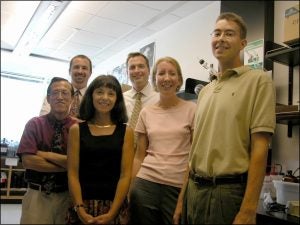NSF grant equips ECU chem labs with spectrometers

A grant from the National Science Foundation will bring two new mass spectrometers to ECU. Principal investigators for the grant are ECU chemists Allison Danell (second from right) and Andrew Morehead (back row, on left). Other scientists who helped Danel
A $503,000 grant from the National Science Foundation will enable the chemistry department at East Carolina University to equip its laboratories with two new mass spectrometers.
ECU chemistry professors Andrew Morehead and Allison Danell received the grant for the equipment in July. Scientists and undergraduate students from many disciplines, including chemistry, biology and medicine, will be able to use the new equipment. A university-wide open access facility is planned to maximize their use.
“It’s really exciting to be involved in providing the advantages of mass spectrometry analysis to the university community,” said Danell, who has worked with mass spectrometry for almost 10 years and develops new analytical chemistry methods using mass spectrometry. Mass spectrometers weigh and measure mass in atoms and molecules.
The mass spectrometers, which should be ready for use in the spring semester, each have different functions. One is a magnetic sector mass spectrometer, which will serve the needs of scientists who study low molecular weight compounds. The second instrument is a quadrupole/time-of-flight hybrid mass spectrometer. It is paired with a liquid chromatograph, a tool that separates compounds before carrying out mass spectrometric analysis.
Morehead, who earned a $228,000 grant from the National Science Foundation in 2004 to research quicker ways to synthesize chemical compounds, said the magnetic sector mass spectrometer would help his project.
“The availability of accurate molecular weight determination on campus will definitely speed up my research,” Morehead said. Other scientists also have projects in the works. ECU chemist Art Rodriguez, for example, will use the mass spectrometer to determine the molecular weights of buckminsterfullerene derivatives.
The capability to separate and then identify many compounds makes the hybrid mass spectrometer helpful for researchers in a variety of fields, including biochemistry and environmental science, Danell said. ECU biologist Cindy Putnam-Evans plans to use the hybrid mass spectrometer to evaluate how heat stress will affect a specific chlorophyll-binding protein.
While members of ECU’s chemistry and biology faculty plan to use the equipment for their own research projects, both Morehead and Danell are excited to share the lab with undergraduate laboratory classes.
“By exposing our students to as much modern chemical instrumentation as possible, they will be even more prepared for the science job market and for graduate or professional school,” Danell said.
In addition to Rodriguez and Putnam-Evans, ECU chemistry colleagues Toby Allen, Colin Burns, Art Rodriguez, Tim Romack, and Frank Yang helped Morehead and Danell in their effort to secure the grant from the National Science Foundation.